2020 marked the fifth summer of our intensive, community-engaged Nepali and Tibetan courses. Take a look below to see what happened!
To read about the Nepali language course (NEPL 390), click here |
|
|
To read about the Tibetan language course (TIBT 390), click here |
Program Overview
The UBC Himalaya Program has offered community-engaged Nepali and Tibetan language courses since 2016. They have grown from 1-week, 1-credit courses to 2-week, 3-credit courses for the third year in a row as of the summer of 2020. Due to the COVID-19 pandemic, course delivery was shifted online, although the blend of traditional ‘classroom’ learning and community engagement was maintained in an adapted form. This year’s courses ran daily from Monday to Friday between May 11th – May 22nd, 2020.
For the first time in 2020, the courses were offered as NEPL 390 and TIBT 390, senior-level undergraduate courses with the Department of Asian Studies. This year new academic readings were assigned to students in the class: including topical readings about relevant Nepali and Tibetan diasporic populations in Vancouver and North America; and theoretical readings about methods and complexities of local community engagement and learning. The readings assisted students in understanding the complex dynamics of the communities who speak the languages they were learning.
To build upon instruction with professors Mr. Binod Shrestha (Nepali) and Mr. Sonam Chusang (Tibetan), students practiced language skills and gained intercultural experiences through community engagement activities online. Students learned from members of the British Columbian Tibetan and Nepali communities, such as artists, singers, and community leaders.
The combination of classroom instruction, in-class activities, and visits to the class from community members and scholars on Nepali and Tibetan culture and society resulted in a successful course experience. Students consistently voiced their positive experiences of intensive language instruction, and were moved by the enthusiasm and assistance from community-engaged activities. Even in the online classroom, students described their learning activities as fun, immersive, and at times inspirational. At the start of the two-week course, some students were somewhat overwhelmed by the intense program of learning they took on, yet by the end were pleased with their growth and proud of their new accomplishments in the Nepali and Tibetan languages.
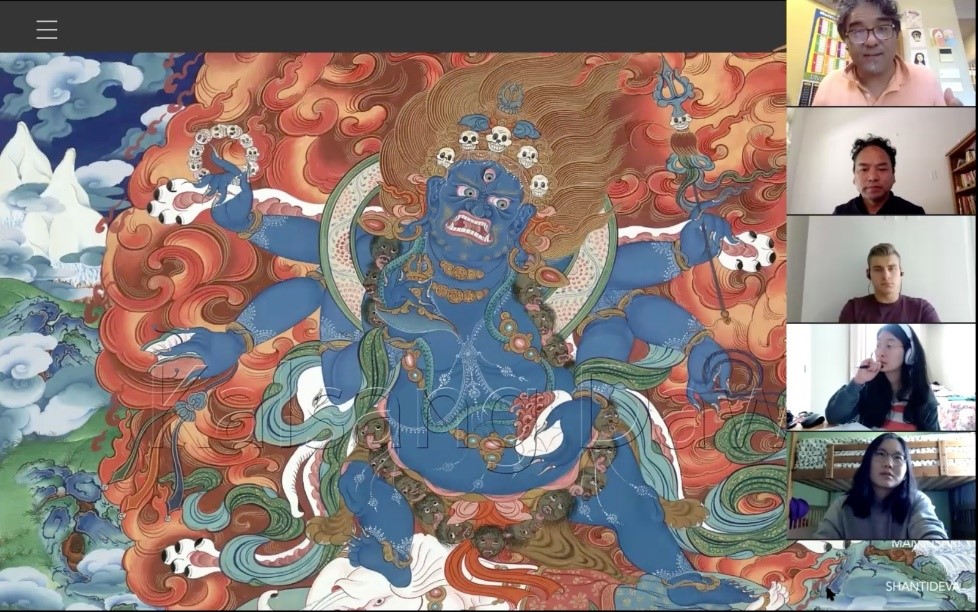
Tibetan language students interact with thangka artist Kalsang Dawa.
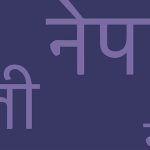
NEPALI 2020
Taught by Mr. Binod Shrestha.
Class Experience
Instruction from the class professor, Mr. Binod Shrestha, developed from previous years while also utilizing new toolsets appropriate for the new digital classroom. For example, Mr. Shrestha built online quizzes, studying materials, and interactive programs for students to practice their Nepali on their own and with peers. These activities and role plays complemented traditional instruction in Nepali grammar, pronunciation, and script writing from the teacher.
“ I would really like to thank Binod Ji for being an amazing professor and caring so much for his students and their learning. I feel it could have not been such a successful online course without him and I am very appreciative to all the work and hours he spent making learning tools such as Quizlet for us.”
 Professor Shrestha teaching the Nepali students. |
Community Engagement
Throughout the two weeks of the course, several members of the Nepali community in British Columbia digitally joined different class sessions. During these periods, students practiced their conversational Nepali with native-language speakers in group and 1-on-1 formats, and learned about different aspects of Nepali and Nepali-Canadian culture. One of the benefits to the online format was the ease with which community members could join the class. For example, on the days when the Nepali Canadian Women’s Society of British Columbia (NCWSBC) or the Hindu-Buddhist Foundation of Canada (HBFC) joined the class, more than ten community members and their families invited students in to their home to learn and practice Nepali. Community organization leaders also taught about different facets of Nepali culture.
“We interacted with the members of the HFBC [Hindu-Buddhist Foundation of Canada] and I think I must’ve used all the Nepali I have learned in the two weeks while talking to my community partner. She was amazing to talk to and extremely patient with me.”
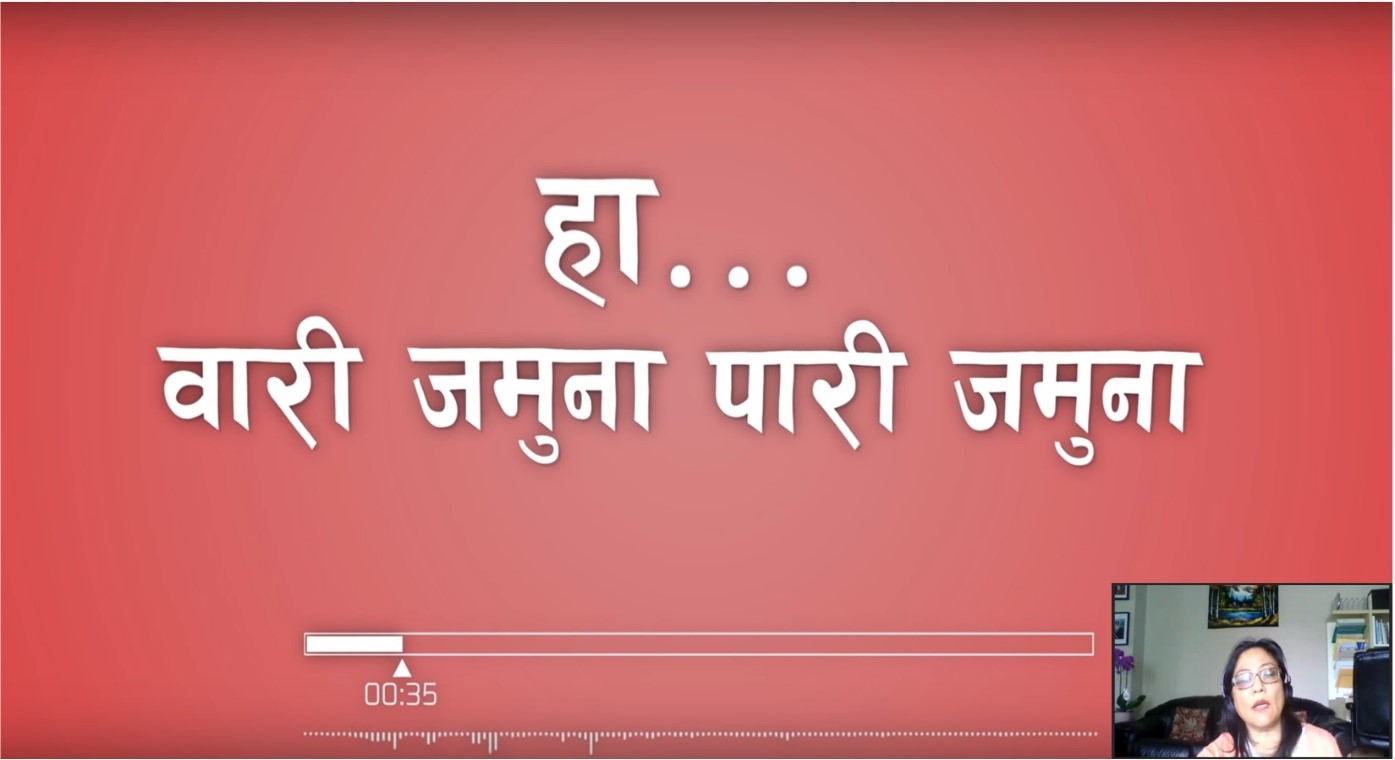
Students learn a Nepali song from Nepali community member Sabita Shrestha.
A local Nepali community member, Sabita Shrestha, also joined the class on two separate occasions to teach students a Nepali song that they could all sing along to. Learning the song helped students read the Nepali script and practice their pronunciation, as well as become acquainted with a style of Nepali music. Ms. Shrestha also taught students about Nepali food, holidays, rituals, and culture and how Nepalis in Greater Vancouver celebrate their traditions. On the last day of the first week, the first Tibetan Buddhist monastery in the Pacific Northwest, Thrangu Monastery in Richmond — where many of the monks speak Nepali — created a dedicated video of the monastery, its grounds, its objectives and history for the students in the class. Several monks also joined the class to practice Nepali and answer questions about Buddhism.
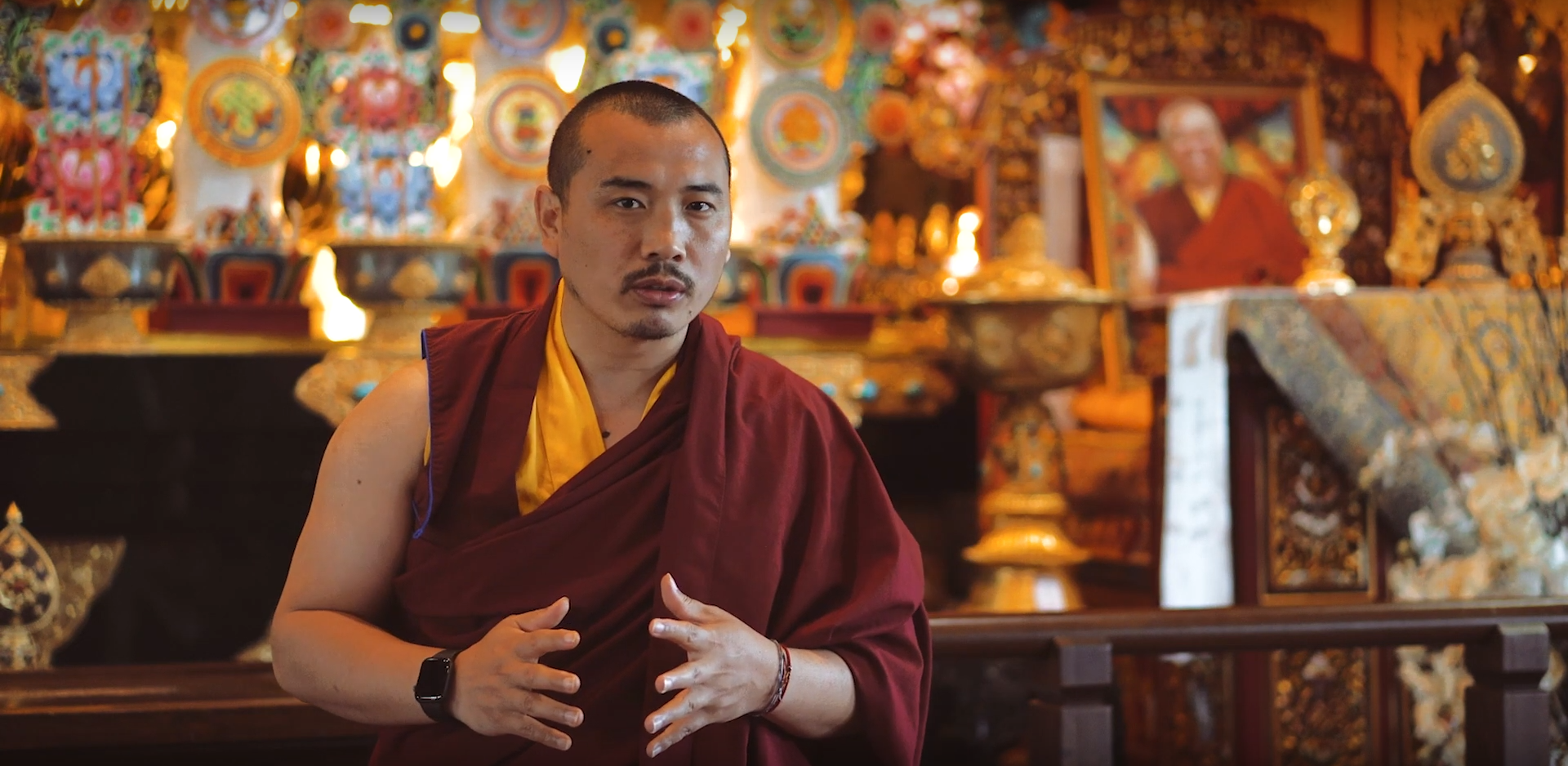 Tenzin Yonten from Thrangu Monastery takes Nepali students on a digital tour of the monastery. |
UBC faculty members and Himalaya Program steering committee co-leads also joined the class to share their expertise in Nepali and Nepali culture. Professor Mark Turin, linguist and anthropologist, visited a class session early in the course to share insight and tips for learning Nepali, as well as its usefulness for various fields, professions, and research interests. Later on, professors Sara Shneiderman and Ratna Shrestha joined a class to speak about their recently published co-authored article that explored dynamics of the Nepali diaspora in BC. They fielded questions about the article, as well as the ramifications of the 2015 earthquakes that hit Nepal and how community groups in BC responded. Students were pleased to have the opportunity to speak and learn closely from expert faculty members on their research interests and to hear about ongoing research in an intimate manner.
“It was really fun to take the course, I learned a lot and I would like to express my gratitude to our professor Binod who taught us with his whole heart and left no stone unturned to teach us the Nepali language.”
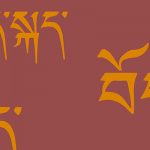 TIBETAN 2020
TIBETAN 2020
Taught by Mr. Sonam Chusang.
Class Experience
Mr. Sonam Rinchen Chusang used the online shift this year to continue expanding the course’s utilization of digital Tibetan language resources, such as Quizlet. The Tibetan course led students through the script and pronunciation of the sound system as well as grammar and vocabulary. Additionally, embedded into the course were numerous activities and speakers which provided cultural context for the language, such as Tibetan music and history. The mixture of lecturing, asynchronous online activities, and in-class activities such as partnered speaking exercises engaged students in a variety of experiences for learning the Tibetan language.
“After the final day of classes, I managed to learn how to formulate the basics of the present tense, future tense, past tense, and the perfect tense. It is incredible what I have managed to learn by the end of such a short period of time studying a language completely from scratch. […] I can talk about so many things in my life including my profession, what I study, my personal information, family, and not only in the present time but what I had studied/done before or will do.”
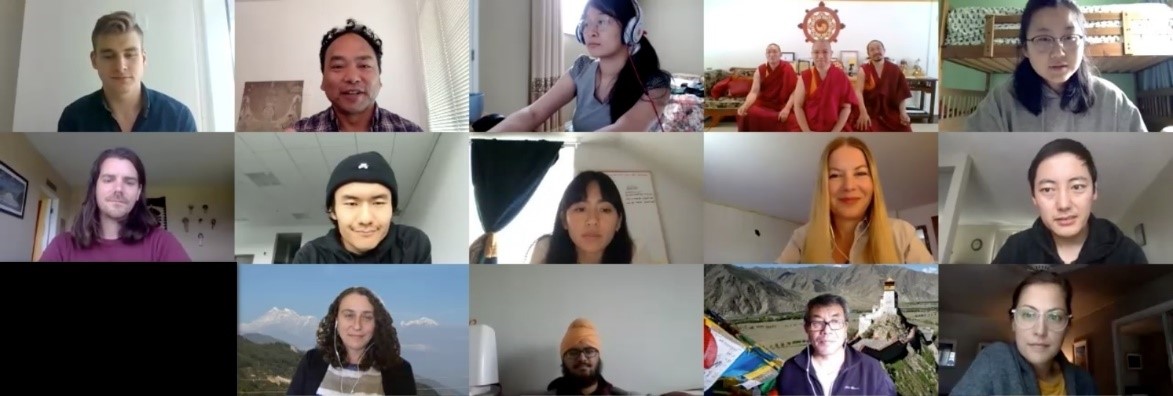
The monks of Tsengdok Monastery join Professor Chusang’s class, along with Tibetan community members and members of the Himalaya Program Steering Committee.
Community Engagement
A range of Tibetan and Tibetan-speaking community members joined the class throughout the course. Three Tibetan speaking individuals living in Vancouver joined the classes numerous times across the two weeks to form language partnerships with students in the course. The language partners provided direct, native-language conversational experience as well as supported student learning from learning the nuances of superscripts to fine-tuning their pronunciation. The language partners joined class sessions for 1-on-1 and small group interactions, are a great touch stone for these students to continue practicing and developing their Tibetan language skills even after the conclusion of the two-week course.
|
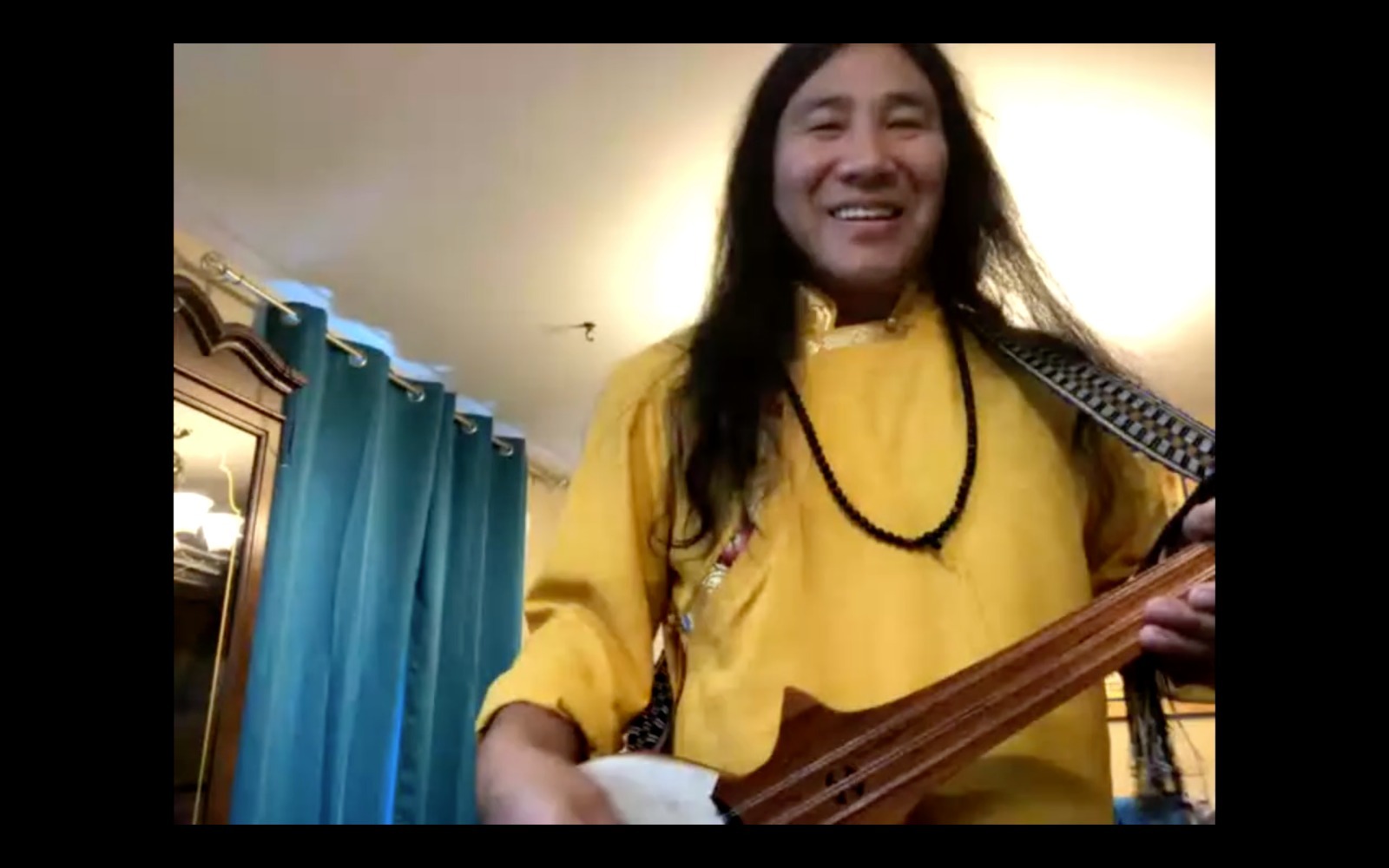
Singer Jamyang Yeshi using his dramnyn string instrument to teach students a Tibetan song.
Students in the class also received close guidance to learn about Tibetan music, including singing a song called Aku Pema. Singer and musician Jamyang Yeshi joined a class session on the first week to teach the song and about Tibetan music, and returned during the second week after the students practiced the song to hear their recital of Aku Pema. Jamyang Yeshi was also featured in a film called Shining Spirit: The Musical Journey of Jamyang Yeshi, which was discussed in class.
Another renowned artist who joined the class is thankga artist Kalsang Dawa, who introduced students to his traditional art and a virtual tour of his studio. He spoke about his creative drive and the artwork’s connection to Tibetan religion, philosophy, and culture. Students were thrilled and inspired by Kalsang Dawa, and felt that this experience provided grounding for their language learning to move far beyond the confines of the virtual classroom.
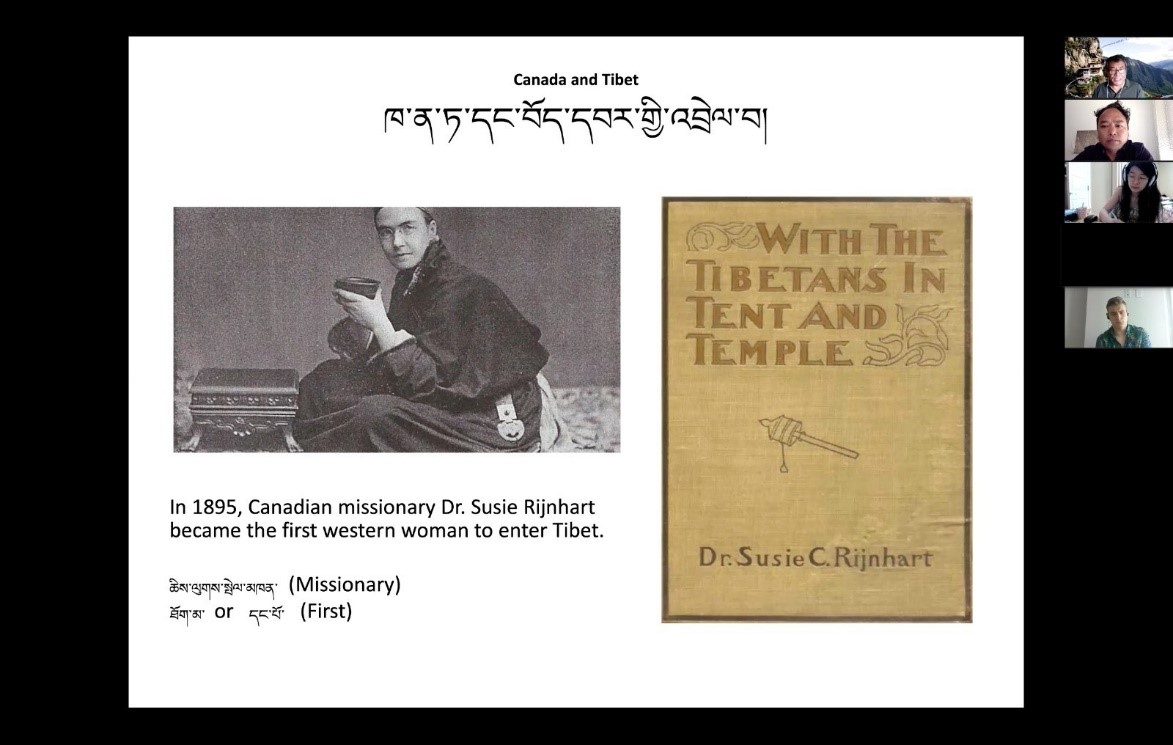
Professor Tsering Shakya sharing information on the history of Tibet and on Tibetans in Canada.
UBC Professor Tsering Shakya joined one class to speak about an article he wrote on Tibetans in North America, as well as provide an overview of Tibetan history and politics. He answered student questions on the topic from his expertise as a scholar of Tibetan history as well as a member of the Tibetan diaspora himself. On the last day of class, Tsengdok Rinpoche and monks from Tsengdok Monastery gave a virtual tour of their monastery and provided a talk about Buddhism in the modern world. Students asked questions to the Rinpoche and practiced their speaking and listening in Tibetan.
“I really do feel like I connected with my peers this way, even if it’s online. The course readings and the language mixed with the community engagement programs are really fulfilling and it feels like I travelled somewhere else during this crazy time. I really felt like I had the world in my hands and I was able to travel even during lockdown and it’s such a fruitful experience. One I’ll never forget.”
To receive up-to-date information about our courses and programs, please sign up for our mailing list.
These courses are supported by the Department of Asian Studies, UBC Faculty of Arts, the Teaching and Learning Enhancement Fund (TLEF), the Centre for Community Engaged Learning (CCEL), the School of Public Policy & Global Affairs / Institute of Asian Research, and UBC Go Global.